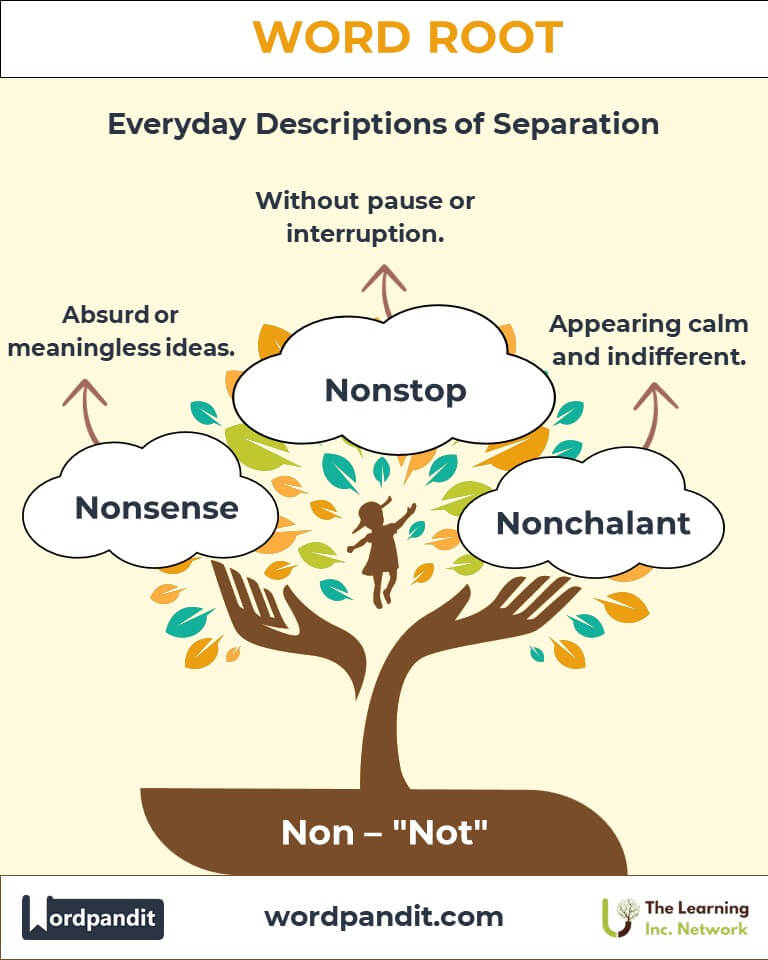Non: The Root of Negation and Neutrality in Language
Discover the power of "non," a versatile root originating from Latin, meaning "not." From everyday terms like "nonsense" to transformative concepts like "nonviolent," this root plays a key role in shaping language, thought, and societal values.

Table of Contents
- Introduction: The Essence of "Non"
- Etymology and Historical Journey
- Mnemonic: Unlocking the Power of "Non"
- Common "Non"-Related Terms
- "Non" Through Time
- "Non" in Specialized Fields
- Illustrative Story: "Non" in Action
- Cultural Significance of "Non"
- The "Non" Family Tree
- FAQs about the "Non" Word Root
- Test Your Knowledge: "Non" Mastery Quiz
- Conclusion: The Negation That Defines Us
Introduction: The Essence of "Non"
The prefix "non-" is a linguistic powerhouse used to convey negation, absence, or neutrality. Derived from Latin, where it simply meant "not," this prefix is foundational in constructing words that negate or counter concepts. Pronounced as "non" (rhyming with "on"), it is an essential element of the English language, shaping vocabulary across disciplines like ethics, philosophy, and science.

Etymology and Historical Journey
The root "non" traces back to Latin, where it meant "not" or "no." It entered Old French and eventually Middle English, carrying its negating essence. Over centuries, "non" evolved to combine with various root words, creating terms that represent absence or opposition. For instance, the concept of "nonviolence" became a cornerstone of peaceful resistance movements worldwide, from Mahatma Gandhi to Martin Luther King Jr.
Mnemonic: Unlocking the Power of "Non"
Imagine a bold, red "NO" sign crossing out a term like "violence" or "sense." This vivid image encapsulates the essence of "non"—the power to negate or deny.
Mnemonic Device:
“Non negates with ease, from nonsense to nonviolence, creating clarity and peace.”
Common "Non"-Related Terms
- Nonsense
Pronunciation: non-sens
Definition: Absurd or meaningless ideas.
Example: "The argument was dismissed as complete nonsense." - Nonviolent
Pronunciation: non-vy-uh-luhnt
Definition: Opposing the use of violence.
Example: "The protest was entirely nonviolent, emphasizing peaceful resistance." - Nonexistent
Pronunciation: non-eg-zis-tuhnt
Definition: Not existing.
Example: "The rumored treasure was found to be nonexistent." - Nonchalant
Pronunciation: non-shuh-lahnt
Definition: Appearing calm and indifferent.
Example: "He remained nonchalant even in stressful situations." - Nonstop
Pronunciation: non-stop
Definition: Without pause or interruption.
Example: "The nonstop flight saved us hours of travel time."
"Non" Through Time
- Nonviolent (20th Century): Popularized by Gandhi’s philosophy, "nonviolence" became a rallying cry for civil rights movements globally.
Impact: Cemented the prefix "non" as a symbol of resistance without aggression. - Nonsensical (17th Century): Initially used in philosophical debates to critique flawed reasoning.
Evolution: Now widely used in casual speech to dismiss absurdity.
"Non" in Specialized Fields
- Philosophy:
- Nonbeing: The absence of existence; a key concept in metaphysics.
Example: "The idea of nonbeing challenges our understanding of existence."
- Nonbeing: The absence of existence; a key concept in metaphysics.
- Science:
- Nonrenewable Resources: Natural resources that cannot be replenished.
Example: "Coal is a nonrenewable resource, necessitating sustainable alternatives."
- Nonrenewable Resources: Natural resources that cannot be replenished.
- Law:
- Noncompliance: The act of not adhering to laws or rules.
Example: "Noncompliance with safety regulations led to heavy fines."
- Noncompliance: The act of not adhering to laws or rules.
Illustrative Story: "Non" in Action
Lila, a passionate environmentalist, championed the use of nonrenewable resources in her community. Through nonviolent protests, she inspired change, demonstrating that negation—whether of waste or aggression—can lead to progress. Her nonsensical critics soon became her supporters, proving the transformative power of "non."
Cultural Significance of "Non"
The prefix "non" symbolizes opposition, neutrality, or absence. From "nonviolence" as a symbol of peace to "nonsense" capturing the absurd, "non" has deeply influenced language, ethics, and culture. Its adoption in global movements underscores its universal relevance.

The "Non" Family Tree
- Un- (Old English): Denotes absence or reversal.
Example: "Unfinished." - In- (Latin): Implies negation or lack.
Example: "Invisible." - Dis- (Latin): Indicates separation or negation.
Example: "Disagree." - A-/An- (Greek): Suggests absence.
Example: "Atheist."

FAQs About the "Non" Word Root
Q: What does "non" mean?
A: The prefix "non" means "not" or "without," indicating a lack or negation of something. For instance, "nonexistent" describes something that does not exist.
Q: Where does "non" originate from?
A: The prefix "non" originates from Latin, where it meant "not." Over time, it entered English through Old French and became a common prefix for forming negated terms.
Q: What is "nonviolence"?
A: Nonviolence refers to a philosophy or practice that rejects the use of physical force to achieve goals. Popularized by leaders like Mahatma Gandhi and Martin Luther King Jr., it advocates peaceful resistance as a powerful tool for social and political change.
Q: How is "non" used in specialized fields?
A: In philosophy, terms like "nonbeing" explore absence or lack of existence. In science, "nonrenewable resources" refer to natural resources like coal that cannot be replenished. In law, "noncompliance" indicates failure to adhere to rules or regulations.
Q: How does "non" differ from other negating prefixes like "un-" or "in-"?
A: While "non-" generally indicates neutral negation (e.g., "nonviolent" means "not violent"), prefixes like "un-" often imply reversal (e.g., "unlock"). "In-" frequently conveys absence or lack, as in "invisible" (not visible).
Test Your Knowledge: "Non" Word Root Quiz
1. What does the prefix "non" signify?
2. Which term describes meaningless talk?
3. What does "nonrenewable" refer to?
4. What does "nonchalant" mean?
5. Which concept was popularized by Gandhi as a form of peaceful resistance?
Conclusion: The Negation That Defines Us
The prefix "non" is a cornerstone of clarity, neutrality, and negation in language. From philosophical debates to everyday speech, its role in shaping thought and communication is profound. As society evolves, so too will the ways we use "non" to negate, clarify, and redefine our world.














